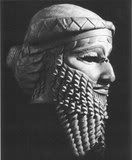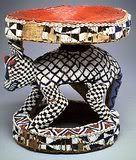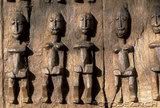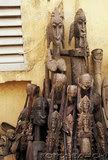Friday, June 1, 2007
Eurocentrism - Superiority of Whites
http://en.wikipedia.org/wiki/Eurocentrism
Eurocentrism
From Wikipedia, the free encyclopedia
Jump to: navigation, search
Eurocentrism is the practice, conscious or otherwise, of placing emphasis on European (and, generally, Western) concerns, culture and values at the expense of those of other cultures. Eurocentrism is an instance of ethnocentrism, perhaps especially relevant because of its alignment with current and past real power structures in the world. Eurocentrism often involved claiming cultures that were not white or European as being such, or denying their existence at all.
The source of a cultural tradition can be seen in the balance of emphasis given to various thinkers and ideas in discussing a subject. In the 1960s a reaction against the priority given to a canon of "Dead White European Males" provided a slogan which neatly sums up the charge of eurocentrism (alongside other important -centrisms).
In Britain, eurocentric and eurocentrist are occasionally used in political discourse to describe supporters of European integration and the European Union, in other words as an antonym of eurosceptic.
Contents[hide]
1 Examples of purported Eurocentrism
2 Origins
3 Challenging Eurocentric models
4 Bibliography
5 See also
6 External links
//
[edit] Examples of purported Eurocentrism
The European miracle theory of Europe's rise to its current economic and political position has often been criticised for Eurocentrism, though the scientific and cultural changes in Europe in the post-Renaissance era are undeniably central to the creation of the modern world.
World map showing Europe horizontally centredCartesian maps have been designed throughout known history to centre the northwestern part of Europe (most notably Great Britain) in the map, although American map makers do otherwise, as do the Chinese. The definition of the prime meridian, placed in Greenwich, London is likewise said to be Eurocentric. The Greenwich Meridian has today been universally recognised as the longitudinal line representing zero degrees east and west mainly because by doing so it places the International Date Line in the Pacific and so inconveniences the smallest number of people. In a purely geographic sense, mainly in cartography, all places in the world not on this meridian are said to be either 'east' or 'west', and hence in either the eastern hemisphere or western hemisphere. Arranging two-dimensional maps in broadly this arrangement has the advantage that it ensures that all land regions can be concentrated in the centre without continents (except Antarctica) being significantly split between the Eastern and Western hemispheres. In such maps the Bering strait is used to split the globe, with the Americas at the left and East Asia at the right. Such maps in fact typically place Africa, not Europe, in the exact centre of the world.
The regional names around the world are named in honour of European travellers and are in orientation of a Eurocentric worldview. Middle East describes an area slightly east of Europe. The Orient or Far East is east of Europe, whereas the West is Western Europe and the Americas (although in modern geopolitical parlance the West also includes South Africa, Australia and can include Japan). Although many of these terms are not intentionally designed to relegate other groups to a subordinate role vis-à-vis the people of Europe, the effects of Eurocentricism create a self-sustaining belief, that Europe and Europeans are central and most important to all meaningful aspects of the world's social values, and cultural heritage. One might defend the current system by saying that to the English, the Americas are to the west. China is also farther east than Iraq, so, at least in English, such names are justified.
World History taught in European and American schools frequently teaches only the history of Europe and the United States in detail, with only brief mention of events in Asia, Africa and Latin America. The Americas, Africa and Australasia are usually not mentioned in the timeline until they are colonised by Europeans, with no reference to the pre-conquest culture, civilisation or technology.
The history of science and technology is often taught as having begun with the Greeks, then moving on with the Romans, then stopping during the Dark Ages, before continuing with the Renaissance and the Industrial Revolution. Less mention is made in European or American schools of the various achievements of ancient Egyptian, Mesopotamian, Indian, Chinese or Muslim thinkers, although in Chinese or Arabic schools other matters are found on the curriculum.
Western accounts of the history of mathematics are often considered Eurocentric in that they do not acknowledge major contributions of mathematics from other regions of the world, such as Indian mathematics, Chinese mathematics, and Islamic mathematics, despite Islamic mathematics, as well as some contributions from India (such as trigonometry and the Indian-Arabic decimal system), having an important influence on Renaissance European mathematics. Most of their other contributions were mainly independently arrived at ideas only "discovered" by the West in the 19th or 20th Centuries.
University courses on the history of human thought that cover Aristotle, Aquinas, Kant and Marx, but neglect Confucius, Buddha, the Upanishads or Avicenna, for example, might be regarded as eurocentric.
In an overview of 17th century history, for instance, it would be seen by some to be eurocentric to list numerous dates, events and political figures from the many states of Europe, but make only brief mentions for the Manchu conquest of China or the Mughals in India, or the Aksum Christian period in Ethiopia.
[edit] Origins
As mentioned earlier, in many Western education systems, history of science and technology is often taught having begun with the Greeks. While indeed, Classical Greek literature has provided the framework for the social, political, and intellectual climate of Modern Europe - there is evidence that many if not most Greek academia was highly biased with Hellenocentricism. The philosophy, historiography, and polity of other highly educated societies which provided research that contradicted the findings of famous Hellenist scholars was often neglected from being taught to students, or worse, treated as invalid until a Greek confirmed the same discovery. Flavius Josephus, a 1st Century CE Jewish intellectual who lived in the metropolis of Alexandria, Egypt wrote a scathing criticism of this institutionalized discrimination, specifically directing it to Western philosophers. (Taken from Against Apion Book I, Chapter 2; emphasis added):
2. And now, in the first place, I cannot but greatly wonder at those men, who suppose that we must attend to none but Greeks, when we are inquiring about the most ancient facts, and must inform ourselves of their truth from them only, while we must not believe ourselves nor other men; for I am convinced that the very reverse is the truth of the case. I mean this, - if we will not be led by vain opinions, but will make inquiry after truth from facts themselves; for they will find that almost all which concerns the Greeks happened not long ago; nay, one may say, is of yesterday only. I speak of the building of their cities, the inventions of their arts, and the description of their laws; and as for their care about the writing down of their histories, it is very near the last thing they set about. However, they [i.e., the Greeks] acknowledge themselves, so far, that it was the Egyptians, the Chaldeans, and the Phoenicians (for I will not now reckon ourselves [i.e, the Israelite civilization] among them) that have preserved the memorials of the most ancient and most lasting traditions of mankind; for almost all these nations inhabit such countries as are least subject to destruction from the world about them; and these also have taken especial care to have nothing omitted of what was done among them; but their history was esteemed sacred, and put into public tables, as written by men of the greatest wisdom they had among them.
Hundreds of years later, little had changed in the academic climate - even after the European Dark Ages forced scholars to turn to Arab, Persian, and Asian cultures for the preservation of Greek knowledge and the progression of science and technology - presumably because the Renaissance which eventually ensued was viewed as a total return to Classical Hellenistic thought (and prejudice). Assumptions of European superiority arose during the period of European imperialism, which started slowly in the 16th century, accelerated in the 17th and 18th centuries and reached its zenith in the 19th century. The progressive character of European culture was contrasted with traditional hunting, farming and herding societies in many of the areas of the world being newly explored by Europeans, such as the Americas, most of Africa, and later the Pacific and Australasia. Even the complex civilizations of the Persia, India, China and Japan were considered to be underdeveloped relative to Europe, and were often characterised as static. For many European writers of this time the history of Europe became paradigmatic for the rest of the world. Other cultures were identified as having reached a stage through which Europe itself had already passed – primitive hunter-gatherer; farming; early civilization; feudalism; modern liberal-capitalism. Only Europe had achieved the last stage. It was thus thought to be uniquely responsible for the scientific, technological and cultural achievements that constitute the modern world. Furthermore, scientific models for understanding the world were deemed to have replaced religious or speculative accounts. The extent to which science itself can be considered to be specifically "European" is still debated.
For some writers, such as Karl Marx, the centrality of Europe to an understanding of world history did not imply any innate European superiority, but he nevertheless assumed that Europe provided a model for the world as a whole. Others looked forward to the expansion of modernity throughout the world through trade or imperialism (or both). By the late 19th Century the theory that European achievements arose from innate racial superiority became widespread: justifying slavery and other forms of political and economic exploitation, even being used to validate genocide.
The colonising period involved the widespread settlement of parts of the Americas and Australasia with European people, and also the establishment of outposts and colonial administrations in parts of Asia and Africa. As a result, the majority populations of the Americas, Australia and New Zealand typically trace their ancestry to Europe. For this reason a Europe-centred history may be taught in such countries, even though their populations are now geographically far removed from Europe itself, but have nevertheless been brought up into what may be regarded as mainly European cultural traditions.
[edit] Challenging Eurocentric models
During the same period that European writers were claiming paradigmatic status for their own history, European scholars were also beginning to develop a knowledge of the histories and cultures of other peoples. In some cases the locally established histories were accepted, in other cases new models were developed, such as the Aryan invasion theory for the origin of Vedic culture in India, which has been criticised for having at one time been modelled in such a way as to support claims for European superiority. At the same time the intellectual traditions of Eastern cultures were becoming more widely known in the West, mediated by figures such as Rabindranath Tagore. By the early 20th century some historians such as Arnold J. Toynbee were attempting to construct multi-focal models of world civilizations. Toynbee also drew attention in Europe to non-European historians such as the medieval Tunisian scholar Ibn Khaldun. He also established links with Asian thinkers, for example through his dialogues with Daisaku Ikeda of Soka Gakkai International.
At the same time, non-European historians were involved in complex engagements with European models of history as contrasted with their own traditions. Historical models centering on China, Japan, India and Persia and other nations existed within those cultures, which to varying degrees maintained their own cultural traditions, though countries that were directly controlled by European powers were more affected by Eurocentric models than were others. Thus Japan absorbed Western ideas while maintaining its own cultural identity, while India under British rule was subjected to a highly Anglocentric model of its history and culture.
Even in the nineteenth century anti-colonial movements had developed claims about national traditions and values that were set against those of Europe. In some cases, as with China, local cultural values and traditions were so powerful that Westernisation did not overwhelm long-established Chinese attitudes to its own cultural centrality. In contrast, countries such as Australia defined their nationhood entirely in terms of an overseas extension of European history. It was, until recently, thought to have had no history or serious culture before colonization. The history of the native inhabitants was subsumed by the Western disciplines of ethnology and archaeology. In central and South America a merger of immigrant and native histories was constructed. Nationalist movements appropriated the history of native civilizations such as the Mayans and Incas to construct models of cultural identity that claimed a fusion between immigrant and native identity.
[edit] Bibliography
Samir Amin: L´eurocentrisme, critique d´une idéologie. Paris 1988, engl. Eurocentrism, Monthly Review Press 1989, ISBN 0853457867
J.M. Blaut: The Colonizer's Model of the World: Geographical Diffusionism and Eurocentric History . Guilford Press 1993. ISBN 0898623480
J.M. Blaut: Eight Eurocentric Historians. Guilford Press 2000. ISBN 1572305916
Dipesh Chakrabarty, Provincializing Europe: Postcolonial Thought and Historical Difference, Princeton UP 2000
Gerhard Hauck, Die Gesellschaftstheorie und ihr Anderes : wider den Eurozentrismus der Sozialwissenschaften, Münster 2003
Vassilis Lambropoulos, The rise of eurocentrism : anatomy of interpretation, Princeton, NJ : Princeton Univ. Press, 1993
Jose Rabasa, Inventing America: Spanish Historiography and the Formation of Eurocentrism (Oklahoma Project for Discourse and Theory, Vol 2), University of Oklahoma Press 1994
Ella Shohat and Robert Stam, Unthinking Eurocentrism: multiculturalism and the media, Routledge 1994
Charlotte Spitzer, Neorassismus und Europa : rassistische Strukturen in der Selbstvergewisserung europäischer Identität, Frankfurt am Main [etc.] : Lang, 2003
Ngugi wa Thiong'o, Moving the Centre: The Struggle for Cultural Freedom, Heinemann Educational Publishers, 1993
Robert J.C. Young, White mythologies : writing history and the west, 2nd edition, Taylor & Francis, 2004
[edit] See also
Afrocentrism
American exceptionalism
Anthropocentrism
Ethnocentrism
Pan-European identity
Orientalism
Postmodernism
Sinocentrism
Japanocentrism
[edit] External links
Eurocentrism in Mathematics
Retrieved from "http://en.wikipedia.org/wiki/Eurocentrism"
Categories: Sociology Ethnocentrism Prejudices Political neologisms Eurocentrism
Eurocentrism
From Wikipedia, the free encyclopedia
Jump to: navigation, search
Eurocentrism is the practice, conscious or otherwise, of placing emphasis on European (and, generally, Western) concerns, culture and values at the expense of those of other cultures. Eurocentrism is an instance of ethnocentrism, perhaps especially relevant because of its alignment with current and past real power structures in the world. Eurocentrism often involved claiming cultures that were not white or European as being such, or denying their existence at all.
The source of a cultural tradition can be seen in the balance of emphasis given to various thinkers and ideas in discussing a subject. In the 1960s a reaction against the priority given to a canon of "Dead White European Males" provided a slogan which neatly sums up the charge of eurocentrism (alongside other important -centrisms).
In Britain, eurocentric and eurocentrist are occasionally used in political discourse to describe supporters of European integration and the European Union, in other words as an antonym of eurosceptic.
Contents[hide]
1 Examples of purported Eurocentrism
2 Origins
3 Challenging Eurocentric models
4 Bibliography
5 See also
6 External links
//
[edit] Examples of purported Eurocentrism
The European miracle theory of Europe's rise to its current economic and political position has often been criticised for Eurocentrism, though the scientific and cultural changes in Europe in the post-Renaissance era are undeniably central to the creation of the modern world.
World map showing Europe horizontally centredCartesian maps have been designed throughout known history to centre the northwestern part of Europe (most notably Great Britain) in the map, although American map makers do otherwise, as do the Chinese. The definition of the prime meridian, placed in Greenwich, London is likewise said to be Eurocentric. The Greenwich Meridian has today been universally recognised as the longitudinal line representing zero degrees east and west mainly because by doing so it places the International Date Line in the Pacific and so inconveniences the smallest number of people. In a purely geographic sense, mainly in cartography, all places in the world not on this meridian are said to be either 'east' or 'west', and hence in either the eastern hemisphere or western hemisphere. Arranging two-dimensional maps in broadly this arrangement has the advantage that it ensures that all land regions can be concentrated in the centre without continents (except Antarctica) being significantly split between the Eastern and Western hemispheres. In such maps the Bering strait is used to split the globe, with the Americas at the left and East Asia at the right. Such maps in fact typically place Africa, not Europe, in the exact centre of the world.
The regional names around the world are named in honour of European travellers and are in orientation of a Eurocentric worldview. Middle East describes an area slightly east of Europe. The Orient or Far East is east of Europe, whereas the West is Western Europe and the Americas (although in modern geopolitical parlance the West also includes South Africa, Australia and can include Japan). Although many of these terms are not intentionally designed to relegate other groups to a subordinate role vis-à-vis the people of Europe, the effects of Eurocentricism create a self-sustaining belief, that Europe and Europeans are central and most important to all meaningful aspects of the world's social values, and cultural heritage. One might defend the current system by saying that to the English, the Americas are to the west. China is also farther east than Iraq, so, at least in English, such names are justified.
World History taught in European and American schools frequently teaches only the history of Europe and the United States in detail, with only brief mention of events in Asia, Africa and Latin America. The Americas, Africa and Australasia are usually not mentioned in the timeline until they are colonised by Europeans, with no reference to the pre-conquest culture, civilisation or technology.
The history of science and technology is often taught as having begun with the Greeks, then moving on with the Romans, then stopping during the Dark Ages, before continuing with the Renaissance and the Industrial Revolution. Less mention is made in European or American schools of the various achievements of ancient Egyptian, Mesopotamian, Indian, Chinese or Muslim thinkers, although in Chinese or Arabic schools other matters are found on the curriculum.
Western accounts of the history of mathematics are often considered Eurocentric in that they do not acknowledge major contributions of mathematics from other regions of the world, such as Indian mathematics, Chinese mathematics, and Islamic mathematics, despite Islamic mathematics, as well as some contributions from India (such as trigonometry and the Indian-Arabic decimal system), having an important influence on Renaissance European mathematics. Most of their other contributions were mainly independently arrived at ideas only "discovered" by the West in the 19th or 20th Centuries.
University courses on the history of human thought that cover Aristotle, Aquinas, Kant and Marx, but neglect Confucius, Buddha, the Upanishads or Avicenna, for example, might be regarded as eurocentric.
In an overview of 17th century history, for instance, it would be seen by some to be eurocentric to list numerous dates, events and political figures from the many states of Europe, but make only brief mentions for the Manchu conquest of China or the Mughals in India, or the Aksum Christian period in Ethiopia.
[edit] Origins
As mentioned earlier, in many Western education systems, history of science and technology is often taught having begun with the Greeks. While indeed, Classical Greek literature has provided the framework for the social, political, and intellectual climate of Modern Europe - there is evidence that many if not most Greek academia was highly biased with Hellenocentricism. The philosophy, historiography, and polity of other highly educated societies which provided research that contradicted the findings of famous Hellenist scholars was often neglected from being taught to students, or worse, treated as invalid until a Greek confirmed the same discovery. Flavius Josephus, a 1st Century CE Jewish intellectual who lived in the metropolis of Alexandria, Egypt wrote a scathing criticism of this institutionalized discrimination, specifically directing it to Western philosophers. (Taken from Against Apion Book I, Chapter 2; emphasis added):
2. And now, in the first place, I cannot but greatly wonder at those men, who suppose that we must attend to none but Greeks, when we are inquiring about the most ancient facts, and must inform ourselves of their truth from them only, while we must not believe ourselves nor other men; for I am convinced that the very reverse is the truth of the case. I mean this, - if we will not be led by vain opinions, but will make inquiry after truth from facts themselves; for they will find that almost all which concerns the Greeks happened not long ago; nay, one may say, is of yesterday only. I speak of the building of their cities, the inventions of their arts, and the description of their laws; and as for their care about the writing down of their histories, it is very near the last thing they set about. However, they [i.e., the Greeks] acknowledge themselves, so far, that it was the Egyptians, the Chaldeans, and the Phoenicians (for I will not now reckon ourselves [i.e, the Israelite civilization] among them) that have preserved the memorials of the most ancient and most lasting traditions of mankind; for almost all these nations inhabit such countries as are least subject to destruction from the world about them; and these also have taken especial care to have nothing omitted of what was done among them; but their history was esteemed sacred, and put into public tables, as written by men of the greatest wisdom they had among them.
Hundreds of years later, little had changed in the academic climate - even after the European Dark Ages forced scholars to turn to Arab, Persian, and Asian cultures for the preservation of Greek knowledge and the progression of science and technology - presumably because the Renaissance which eventually ensued was viewed as a total return to Classical Hellenistic thought (and prejudice). Assumptions of European superiority arose during the period of European imperialism, which started slowly in the 16th century, accelerated in the 17th and 18th centuries and reached its zenith in the 19th century. The progressive character of European culture was contrasted with traditional hunting, farming and herding societies in many of the areas of the world being newly explored by Europeans, such as the Americas, most of Africa, and later the Pacific and Australasia. Even the complex civilizations of the Persia, India, China and Japan were considered to be underdeveloped relative to Europe, and were often characterised as static. For many European writers of this time the history of Europe became paradigmatic for the rest of the world. Other cultures were identified as having reached a stage through which Europe itself had already passed – primitive hunter-gatherer; farming; early civilization; feudalism; modern liberal-capitalism. Only Europe had achieved the last stage. It was thus thought to be uniquely responsible for the scientific, technological and cultural achievements that constitute the modern world. Furthermore, scientific models for understanding the world were deemed to have replaced religious or speculative accounts. The extent to which science itself can be considered to be specifically "European" is still debated.
For some writers, such as Karl Marx, the centrality of Europe to an understanding of world history did not imply any innate European superiority, but he nevertheless assumed that Europe provided a model for the world as a whole. Others looked forward to the expansion of modernity throughout the world through trade or imperialism (or both). By the late 19th Century the theory that European achievements arose from innate racial superiority became widespread: justifying slavery and other forms of political and economic exploitation, even being used to validate genocide.
The colonising period involved the widespread settlement of parts of the Americas and Australasia with European people, and also the establishment of outposts and colonial administrations in parts of Asia and Africa. As a result, the majority populations of the Americas, Australia and New Zealand typically trace their ancestry to Europe. For this reason a Europe-centred history may be taught in such countries, even though their populations are now geographically far removed from Europe itself, but have nevertheless been brought up into what may be regarded as mainly European cultural traditions.
[edit] Challenging Eurocentric models
During the same period that European writers were claiming paradigmatic status for their own history, European scholars were also beginning to develop a knowledge of the histories and cultures of other peoples. In some cases the locally established histories were accepted, in other cases new models were developed, such as the Aryan invasion theory for the origin of Vedic culture in India, which has been criticised for having at one time been modelled in such a way as to support claims for European superiority. At the same time the intellectual traditions of Eastern cultures were becoming more widely known in the West, mediated by figures such as Rabindranath Tagore. By the early 20th century some historians such as Arnold J. Toynbee were attempting to construct multi-focal models of world civilizations. Toynbee also drew attention in Europe to non-European historians such as the medieval Tunisian scholar Ibn Khaldun. He also established links with Asian thinkers, for example through his dialogues with Daisaku Ikeda of Soka Gakkai International.
At the same time, non-European historians were involved in complex engagements with European models of history as contrasted with their own traditions. Historical models centering on China, Japan, India and Persia and other nations existed within those cultures, which to varying degrees maintained their own cultural traditions, though countries that were directly controlled by European powers were more affected by Eurocentric models than were others. Thus Japan absorbed Western ideas while maintaining its own cultural identity, while India under British rule was subjected to a highly Anglocentric model of its history and culture.
Even in the nineteenth century anti-colonial movements had developed claims about national traditions and values that were set against those of Europe. In some cases, as with China, local cultural values and traditions were so powerful that Westernisation did not overwhelm long-established Chinese attitudes to its own cultural centrality. In contrast, countries such as Australia defined their nationhood entirely in terms of an overseas extension of European history. It was, until recently, thought to have had no history or serious culture before colonization. The history of the native inhabitants was subsumed by the Western disciplines of ethnology and archaeology. In central and South America a merger of immigrant and native histories was constructed. Nationalist movements appropriated the history of native civilizations such as the Mayans and Incas to construct models of cultural identity that claimed a fusion between immigrant and native identity.
[edit] Bibliography
Samir Amin: L´eurocentrisme, critique d´une idéologie. Paris 1988, engl. Eurocentrism, Monthly Review Press 1989, ISBN 0853457867
J.M. Blaut: The Colonizer's Model of the World: Geographical Diffusionism and Eurocentric History . Guilford Press 1993. ISBN 0898623480
J.M. Blaut: Eight Eurocentric Historians. Guilford Press 2000. ISBN 1572305916
Dipesh Chakrabarty, Provincializing Europe: Postcolonial Thought and Historical Difference, Princeton UP 2000
Gerhard Hauck, Die Gesellschaftstheorie und ihr Anderes : wider den Eurozentrismus der Sozialwissenschaften, Münster 2003
Vassilis Lambropoulos, The rise of eurocentrism : anatomy of interpretation, Princeton, NJ : Princeton Univ. Press, 1993
Jose Rabasa, Inventing America: Spanish Historiography and the Formation of Eurocentrism (Oklahoma Project for Discourse and Theory, Vol 2), University of Oklahoma Press 1994
Ella Shohat and Robert Stam, Unthinking Eurocentrism: multiculturalism and the media, Routledge 1994
Charlotte Spitzer, Neorassismus und Europa : rassistische Strukturen in der Selbstvergewisserung europäischer Identität, Frankfurt am Main [etc.] : Lang, 2003
Ngugi wa Thiong'o, Moving the Centre: The Struggle for Cultural Freedom, Heinemann Educational Publishers, 1993
Robert J.C. Young, White mythologies : writing history and the west, 2nd edition, Taylor & Francis, 2004
[edit] See also
Afrocentrism
American exceptionalism
Anthropocentrism
Ethnocentrism
Pan-European identity
Orientalism
Postmodernism
Sinocentrism
Japanocentrism
[edit] External links
Eurocentrism in Mathematics
Retrieved from "http://en.wikipedia.org/wiki/Eurocentrism"
Categories: Sociology Ethnocentrism Prejudices Political neologisms Eurocentrism
Labels: Eurocentrism
Subscribe to Comments [Atom]







